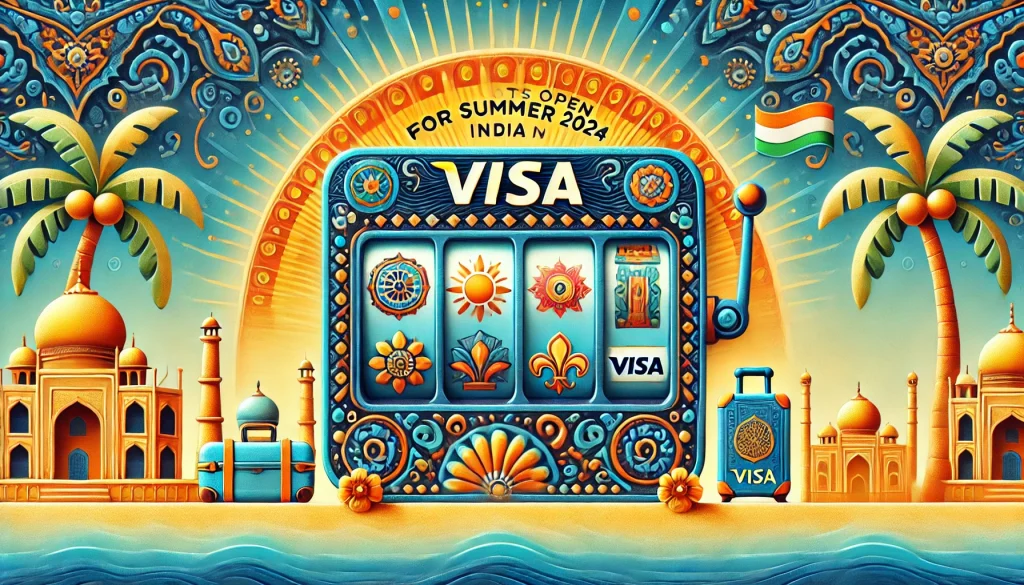
A Complete Guide to Summer 2024 Visa Slots in India As the globe slowly gets over the COVID-19 pandemic’s disruptions, demand for international travel is rising significantly. Knowing the availability of visa slots is essential for many people planning to travel to or from India in the summer of 2024. The term “visa slots” refers to the designated timeslots that embassies & consulates set aside for the necessary visa interviews. Since June through August are typically the busiest travel seasons, there is more competition for these few available spots.
Prospective tourists must thus keep up with the most recent information about the application procedure and the availability of visa slots. The management of visa applications by the Indian government & its diplomatic missions is anticipated to prioritize efficiency and transparency in 2024. Nonetheless, candidates should be ready for possible difficulties, such as strong competition and a shortage of spots. Depending on the kind of visa being applied for—tourist, student, or employment—the circumstances may change.
To ensure they get the visa slots they want as soon as possible, applicants must thus prepare ahead of time and keep an eye on official announcements from the appropriate authorities. Usually, the first step in the application process for obtaining a visa slot in India is filling out an online application. Applicants must fill out this form with their personal information, travel itinerary, and reason for visiting. Applicants must pay the required visa fee, which varies based on the type of visa being sought, after completing the form.
Following payment, candidates can book a time slot at the closest embassy or consulate for their visa interview. Scheduling this appointment as soon as possible is advised, particularly during busy times like the summer of 2024 when spots are likely to fill up fast. In order to get ready for their visa interview, candidates must gather all required paperwork & information after scheduling an appointment. This planning is essential since it has a big influence on how the visa application turns out. Based on the applicant’s answers & supporting documentation, consular officials will determine the applicant’s eligibility during the interview.
A well-prepared applicant has a higher chance of success, so it’s critical to approach this step with clarity & confidence. In general, being aware of each stage of the application procedure can help to expedite the process and raise the likelihood of being granted a visa slot. Depending on the kind of visa being applied for, eligibility requirements for visa slots in India can differ greatly.
For example, tourist visas typically require documentation of travel arrangements, such as reservations for hotels & flights, as well as proof that the applicant has enough money to cover costs while visiting. On the other hand, documents proving enrollment in an Indian educational institution, such as acceptance letters and evidence of tuition payment, are required for student visas. Additional documents from Indian employers, such as sponsorship letters and job offers, may be needed for work visas. Candidates must be aware of these particular requirements in order to make sure they fulfill all requirements.
Also, applicants need to think about general eligibility requirements that are applicable to different types of visas. These could include health requirements like immunizations or medical exams, age limitations, and criminal background checks. Candidates must carefully go over these requirements before submitting an application for a visa slot. If any of these conditions are not met, applying for a visa may be delayed or denied. Thus, potential tourists should plan their trip well in advance of the dates they want to go & prepare all required paperwork.
Having the appropriate paperwork is essential for a seamless visa application process in India. Depending on the kind of visa being applied for, different documents may be needed; however, most applicants will need to submit a few common documents. These usually consist of a completed visa application form, recent passport-sized photos that adhere to certain standards, and a valid passport that is at least six months past the planned departure date. Proof of travel plans, such as flight schedules & hotel reservations, might also be needed to prove why the person is traveling.
Applicants may be required to submit additional materials in addition to these standard documents, contingent on their specific situation. For example, when requesting a study visa, students must submit financial statements attesting to their ability to support themselves while they are enrolled in school as well as proof of admission from an Indian institution with accreditation. In a similar vein, applicants for work visas must provide employment contracts or offers from Indian companies along with any pertinent professional certifications or qualifications. Avoiding hiccups or delays in the application process requires making sure that all necessary documents are correct & comprehensive.
Applying for a visa during the busy summer months can be difficult, but there are a few tactics applicants can use to increase their chances of getting one. Above all, it is best to begin the application process as soon as possible. Taking advantage of the fact that many embassies and consulates allow applicants to schedule appointments months in advance can help ensure that a preferred time slot is available before they fill up. Also, frequent visits to official embassy websites or social media accounts can yield insightful information about available slots and any modifications to protocols. Making sure all paperwork is ready before the visa interview is another smart move.
Verifying that all forms are completed accurately and that all necessary documents are arranged and easily available are part of this. Being well-prepared gives you confidence during the interview process and shows professionalism. In order to clearly and persuasively express their intentions, candidates should also rehearse standard interview questions pertaining to their trip itinerary and reason for visiting. Applying for a visa can be difficult, and many applicants make common mistakes that make it harder for them to get a slot.
Not filling out the application form with accurate or complete information is a common mistake. Throughout the review process, discrepancies or omissions can raise concerns and result in delays or outright rejections. Consequently, it is essential that applicants take their time filling out forms and make sure that all of the information on them corresponds with the supporting documentation.
Another common error is not being sufficiently prepared for the actual visa interview. Many applicants may arrive unprepared or without the required paperwork because they undervalue the significance of this step. This lack of planning may lead to unfavorable results or lost opportunities.
In order to steer clear of this hazard, candidates should prepare their answers to frequently asked interview questions and make sure they have all necessary paperwork prepared and in order. In order to efficiently manage demand, embassies and consulates in India have established specific guidelines that govern the visa slot allocation system. Depending on a number of variables, including operational capacity & staffing levels, each diplomatic mission has a fixed number of slots available each day or week. While making sure that every applicant gets enough attention during the interview process, this system seeks to strike a balance between efficiency and accessibility. When applying for a visa slot, applicants can better plan their approach if they are aware of how this system operates.
Also, it’s crucial to remember that different visa categories might have distinct allocation procedures. For instance, student visas might have slots reserved for them during particular times that correspond with school calendars, whereas tourist visas might have more availability during off-peak times. Also, depending on specific circumstances, certain embassies may prioritize urgent cases or adopt a first-come, first-served policy. When applying for summer 2024 visa slots, applicants can put themselves in a better position by being aware of these subtleties in the allocation process.
Many potential tourists are worried about visa slots in India as the summer of 2024 draws near. One frequently asked question concerns the best time to apply for a visa slot. In general, it is best to start the application process at least three months before the planned travel dates. This gives enough time to schedule an appointment and take care of any possible processing-related problems.
What happens if an applicant fails to show up for their scheduled appointment is another commonly asked question. In these situations, the majority of embassies permit people to reschedule their interviews; however, each mission’s particular policies & availability may determine this. If applicants experience any problems with their appointments, it is imperative that they contact embassy personnel as soon as possible. Travelers can more successfully negotiate the difficulties of obtaining a visa slot by taking proactive measures to address these issues.
In conclusion, potential tourists wishing to investigate opportunities overseas or return home after prolonged stays abroad must comprehend the complexities of securing a visa slot for summer 2024 in India. Applicants can increase their chances of obtaining a visa slot during this popular travel season by becoming familiar with the application procedure, eligibility requirements, necessary paperwork, & typical pitfalls to avoid.

